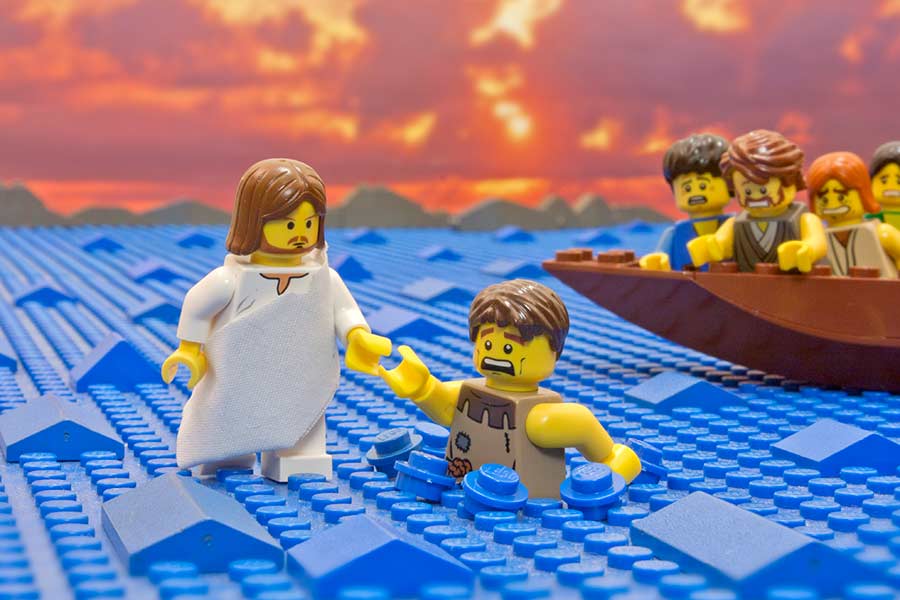Once back among the Saints, the prophet selected a location for a new Mormon settlement in Illinois, and gave it the name Nauvoo, a Hebrew word for "beautiful". Due to recent circumstances, the Saints had little money available, so lands were purchased largely on credit—a debt that would become a heavy burden on the Church and was never fully resolved.
The Saints began building basic shelters—tents, huts, and simple log cabins—but soon fell victim in large numbers to malaria from mosquitos breeding in the nearby swampland along the Mississippi. The prophet and his six-year-old son both became ill, but after a few days Smith arose, full of the Spirit of the Lord. He administered to many of the sick with great power, healing even those at the brink of death.
Despite these miracles, the epidemic spread throughout summer and autumn and caused many deaths, with some families suffering the loss of two or three of their loved ones. Among the Goddard family, for instance, both parents and their 16-year-old daughter died. All of the Twelve Apostles became ill as well, rendering them unable to obey a recent revelation Joseph Smith had received from Jesus, ordering the Apostles to leave on a mission to Great Britain on a specified date.
By August, the Apostles became determined to obey Jesus's command despite their lingering illnesses. Wilford Woodruff recalled: "I laid my hands upon the head of my sick wife, Phoebe, and blessed her. I then departed from the embrace of my companion, and left her almost without food or the necessaries of life." Brigham Young departed in the immediate wake of his wife giving birth, noting "my very inmost parts would melt within me at leaving my family in such a condition, as it were almost in the arms of death."
Smith had given the Twelve Apostles the same traveling instruction the Savior had given his disciples during his ministry on earth, telling them to "go forth without purse or scrip". As they traveled by rail to the East Coast, more than $87 was spent on train fare, and every time Brigham Young reached into his suitcase to pay, he miraculously found just enough money for the next stage of the trip.
They arrived in Liverpool on the day of the 10th anniversary of the establishment of the Church, April 6, 1840. The Apostles found a very receptive audience among the lower classes in Britain whose lives had been disrupted by the industrial revolution. A young missionary named Lorenzo Snow was put in charge of the Church in Britain, and he presented to Queen Victoria and Prince Albert a pair of beautifully-bound copies of the Book of Mormon.
Joseph Smith had put out a call to Mormons everywhere to gather to Nauvoo in Illinois, and the new British converts were eager to immigrate. Over the next ten years more than 10,000 made the voyage to America. "They have so much of the spirit of gathering," noted Brigham Young, "that they would go if they knew they would die as soon as they got there or if they knew that the mob would be upon them and drive them as soon as they got there."
Apostle Orson Hyde—who was restored to his position after repenting his error in aiding the enemy at Far West—was too sick to join in the mission to Britain. In April of 1840, however, the prophet called him on a mission to Palestine. He arrived there six months later, and after a few unsuccessful days of missionary work, he climbed the Mount of Olives to dedicate the Holy Land for the regathering of the Jews and the rebuilding of their Jerusalem Temple.
Jesus revealed to the prophet that the Church should appeal to the federal government to redress the wrongs the state of Missouri had inflicted on the Saints. In November of 1839, Joseph Smith came to Washington, DC, and met with a very reluctant Martin Van Buren. The president listened to Smith's list of grievances, but replied insolently, " Your cause is just, but I can do nothing for you."
After an attempt to meet with Senator John C. Calhoun was rebuffed, the prophet returned to Nauvoo, where at a conference of the Church that April, he argued, "If all hopes of obtaining satisfaction for the injuries done us be entirely blasted,” they must “appeal our case to the Court of Heaven, believing that the Great Jehovah, who rules over the destiny of nations, and who notices the falling sparrows, will undoubtedly redress our wrongs, and ere long avenge us of our adversaries."
NEXT:
Also from the creator of The Brick Book of Mormon:

